Meet the family behind Yorkshire's largest vineyard
The largest of these is Little Wold Vineyard, which is based on the edge of the Yorkshire Wolds near South Cave in East Yorkshire.
It was established in 2012 by a family who have farmed in the village for three generations and took the brave step of diversifying from traditional arable and livestock farming into wine production.
Advertisement
Hide AdAdvertisement
Hide AdThe Wilson family’s gamble appears to have paid off as they’ve since won a string of awards for their growing range of wines, as well as developing a popular wedding and events venue on the same site.
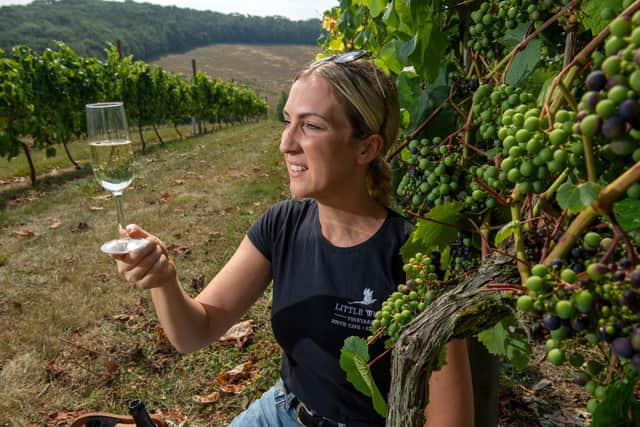

Henry Wilson, whose father, Robert, bought Market Place Farm in the village in 1947 when the nearby Cave Castle estate was divided up and sold off, came up with the idea of growing vines during a visit to South Africa.
When he returned home, he carried out some research and sought guidance from Stewart Smith, a vine expert based in Malton, North Yorkshire. Stewart visited Henry’s farm and gave the exciting project a big thumbs up.
Henry’s daughter, Alice Maltby, explains: “A lot of the farm is made up of steep, chalk hillsides, which are useless for growing crops and difficult for livestock. We had to find a use for them – it was either that or sell up.
Advertisement
Hide AdAdvertisement
Hide Ad“Soil samples were taken and we planted a number of different varieties to see what worked well. These included some familiar varieties, such as Chardonnay and Pinot Noir, along with some more typically English varieties, such as Rondo, Madeleine Angevine and Solaris.”
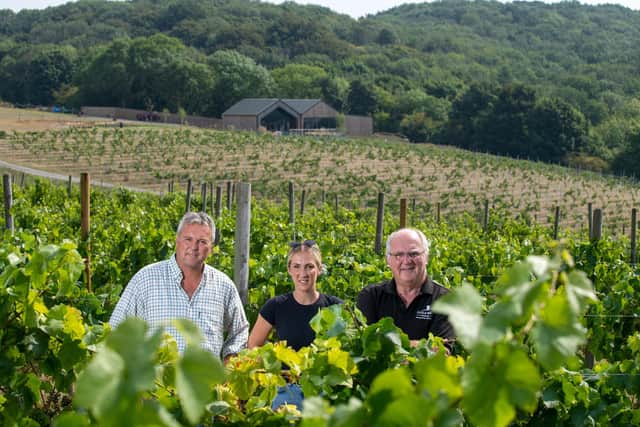

The first 2,000 vines were planted in the spring of 2012 and, to keep costs down, everything was done by hand.
Alice recalls: “Dad chose a field tucked away from sight, just in case it all went wrong, but this proved to be the best thing we could have done as the views from the site are something special.”
For the first three years, everything that grew, including the grapes, had to be cut off and thrown away. This was necessary to develop the root stock and encourage the vines to take in the chalky minerals of the ‘terroir’, the all-important set of environmental factors that give the wine its unique character.
Advertisement
Hide AdAdvertisement
Hide Ad“We knew that there’d be no income from the vineyard for the first five years, so we’ve had to do other things to plug the gap.
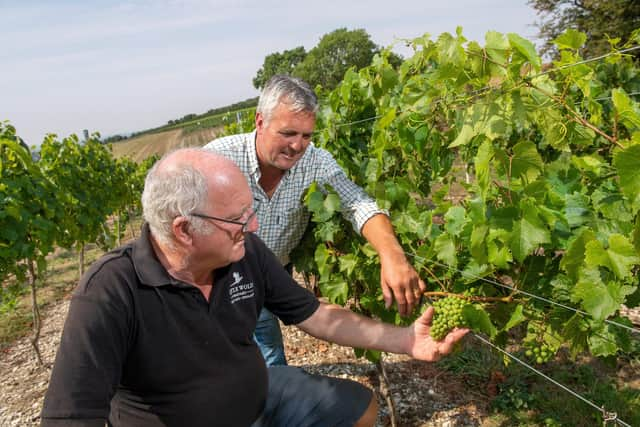

"Just reaching the point where we were producing our own wine was the result of years of sheer hard work,” says Alice.
It wasn’t until 2016 that the Wilson family were able to harvest their first full crop of grapes.
“Our 2016 harvest proved to be our first real wine-maker; our Barley Hill White and Poppy Hill Rosé were bottled in 2017 and won their first award later in the year.”
Advertisement
Hide AdAdvertisement
Hide AdThe family now have 20,000 vines, most of which are at their main site in South Cave, although they now also manage vineyards in Lincolnshire and South Yorkshire, which has enabled them to substantially increase their grape yield until some of their own newly planted vines have time to get established.
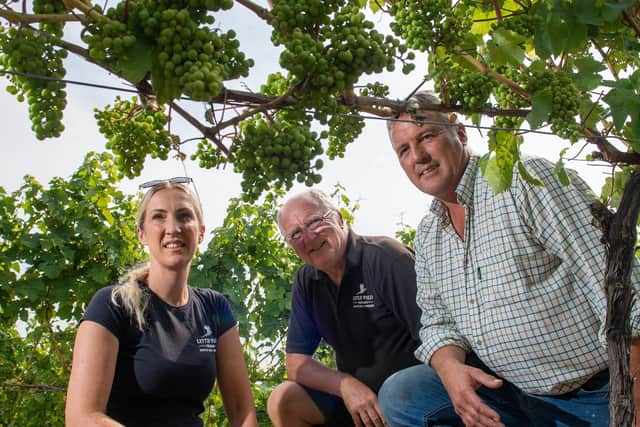

As the vineyard has grown, the Wilson family have experimented with a wider range of grape varieties and now produce red and sparkling wines, as well as their white and rosé wines.
While her brother, Tom, oversees the agricultural side of the wine production business, as well as growing wheat, oilseed rape and crops used in the production of renewable energy, Alice manages the weddings and events arm of the operation, hosting 46 weddings this year alone, as well as staging vineyard tours, wine tastings and other events.
Although the Covid-19 pandemic severely impacted upon Little Wold Vineyard’s ability to host events and their wholesale wine trade to restaurants and other venues, it did provide a unique opportunity for the family to embark on a major construction project.
Advertisement
Hide AdAdvertisement
Hide AdThey seized the chance to extend their tasting room, which means that they can now host events all year round, as well as investing in the development of their own on-site winery.
“Lockdown could have been sink or swim; as well as being a major source of revenue, our events are an important sales outlet for our wines, so we were doubly hit by lockdown restrictions,” says Alice.
“We had to try to do our best with what we had. We realised that, although the marquee where we hosted weddings and events was great, it was a bit limiting so we managed to build the extension during a period when we couldn’t really be in business anyway.
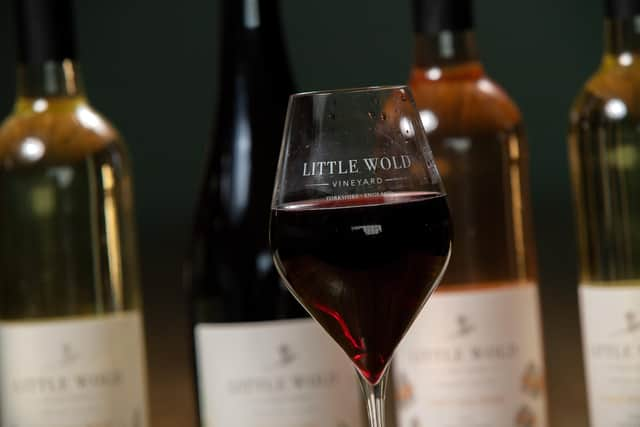

"Having the new, larger tasting room means that we can now offer weddings, wine tastings and other events all year round, rather than just in the summer months.”
Advertisement
Hide AdAdvertisement
Hide AdTo keep the business ticking over until restrictions aimed at limiting the spread of Covid-19 eased, the Wilsons focused on online wine sales and began to host online tasting events, decanting their wines into smaller tasting bottles and distributing them to customers across the UK.
“With large weddings, tasting events and tours cancelled, we had to adapt quickly without really knowing what the future held. We also launched picnics in the vineyard and offered micro-weddings that were in line with Covid guidance.”
Alice and Tom also used the unexpected pause in their usual activities to work towards professional wine-making qualifications.
This means that they will be producing their own wines in their brand new winery at South Cave for the first time when the 2022 grapes are harvested from late September onwards.
Advertisement
Hide AdAdvertisement
Hide AdTheir grapes were previously turned into wine at a third party site in the Midlands.
Alice explains: “Developing the winery involved building a new shed, buying all the equipment and applying for the various licences and permissions and so on.
"It was a huge investment and a lot of work. Tom and I will be working together on the winemaking side of things but, for the first year, we’ll have the support of a consultant.
"This is an important step in our journey. Environmentally and from a quality point of view, it’s the right thing to do.”
Advertisement
Hide AdAdvertisement
Hide AdLittle Wold Vineyard now employs 15 people and, in 2020, it won Farmer’s Weekly magazine’s Diversification of the Year Award.
Other recent awards include a Silver Medal from Wines of Great Britain for Little Wold’s Three Cocked Hat red wine, as well as earlier accolades for its Barley Hill White, Chalk Hill White and Poppy Hill Rosé.
Meanwhile, Alice picked up the New Business and Overall Winner titles at Women in Business Hull’s annual Women of Achievement Awards in 2018 in recognition of her role in building the family’s vineyard and juggling her workload with the demands of raising her young family.
Little Wold Vineyard’s Cellar Door Shop is now open to the public on Fridays and Sundays, from 11am to 4pm.
Advertisement
Hide AdAdvertisement
Hide AdIt serves coffee, cake and, of course, wine, as well as offering visitors a great vantage point from which to view the vines where the grapes are grown.
Customers can also buy bottles of wine and other gifts to take home with them.
